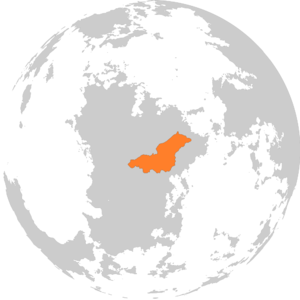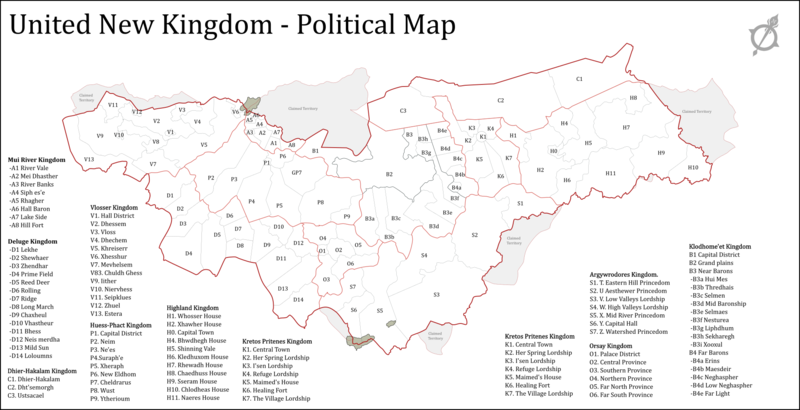United New Kingdoms: Difference between revisions
No edit summary |
|||
| Line 114: | Line 114: | ||
== Economy == | == Economy == | ||
The economy of the UNK has endured continuous decades of isolation, hampered by a small population and limited natural resources. For the first seventy years of the century, its economy was almost entirely focused on supporting national defense and providing the basic necessities for the UNK Wolgos population. The dominant agricultural and pastoral sectors, along with a robust timber industry, underpinned this strategy of self-sufficiency. These industries produced foodstuffs, textiles, leather, and other essential consumer goods, ensuring the survival of the population under an autarkic economic model. | |||
Heavy industry in the UNK leveraged vast peat reserves and moderate iron deposits to produce steel for machinery, construction, and, most importantly, weapons. Despite these efforts, the UNK remained dependent on clandestine imports of weaponry from Kusawen to bolster its defenses and fortify the border with the Stolvic Altaian Commonholds to the south. | |||
A significant aspect of the UNK's economy is the dominance of large ranchers, whose vast holdings of land make them economic powerhouses. These ranchers, often kings and princes in their own right, supplement their wealth with opium farming and processing. This lucrative crop is smuggled into wider Altaia and Gotha, providing a critical stream of income that supports their vast private armies. These armies, in turn, work collaboratively to defend the UNK, ensuring the security of their holdings and the nation as a whole. | |||
Since 7679, the economic fortunes of the UNK have dramatically improved due to substantial subsidies from Hergom. The military has been thoroughly modernized to Hergom standards, alongside enhanced defenses. The influx of machinery and goods from Hergom has significantly uplifted the UNK's economy and living standards. However, the UNK remains entirely dependent on Hergom for trade. Imports are costly due to the nation's isolation and landlocked position, with sea routes being impossible. Trade relies on high-capacity dirigibles and, to a lesser extent, cargo airplanes. Trade routes require constant negotiation with Kamura and Nation 166, posing a persistent logistical challenge. | |||
Rhagher, the capital city of the UNK, is a small urban center with a population of just 200,000, nestled by a lakeside. Despite its size, Rhagher plays a crucial role in the nation's economy. It is dominated by light and medium industry, including the nation's main weaponsmith factories, which are essential for both domestic security and potential exports. The city has grown modestly but steadily, driven by the industrial activities that support the UNK's broader economic needs. | |||
Over the past decade, economic growth has surged, fueled by the influx of Hergom-made goods sold at well below market prices or outright gifted. The construction industry has expanded rapidly as the UNK works to further fortify its border with the Stolvic Commonholds. The UNK's reliance on exporting clandestine substances has diminished, ceasing their flow into Kusawen or the Kamuran Empire. This shift marks a significant change in the economic landscape, reflecting the profound impact of Hergom's support and the ongoing efforts to stabilize and grow the UNK's economy. The presence of dominant ranchers and their vast private armies continues to shape the social and economic structure of the UNK, maintaining a unique blend of agricultural dominance and militaristic oversight that defines this isolated nation. | |||
== Military == | == Military == | ||
Revision as of 05:29, 30 May 2024
| United New Kingdoms Leh1gnewos h3regtom | |
| Flag | Coat of arms |
|---|---|

|

|
| Motto: "Through Adversity and blood to the end times" | |
| Anthem: Song of Anaria | |
| Locator map | |

| |
| Capital city | Rhagher |
| Largest city | Rhagher |
| Official language | Wolgos |
| Other languages | Regional dialects |
| Ethnic group | Wolgos - Other |
| Religion | Dlroch'veldr |
| Demonym(s) | Leh1gnewos Wolgos |
| Government | |
| Government Type | Federated kingdoms |
| H1legh3regs (Elected King) | Wednus Wednusunus of the H2wednus tribe, of the Dhegwhomnis clan |
| Kaputmedhu (Chancellor) | H1eyros Weyrosunus of the H2r̥tkos tribe, of the Seh2ulyu clan |
| Legislature | Hall of Unity |
| Establishment | |
| Collapse of the Bind | 7603 CE |
| Area | |
| Total | 1,896,845.54 km2 |
| Water % | 5.0% |
| Population | |
| Total | 8,686,225 |
| Density | 4.58/km2 |
| Economy | |
| Economy type | Capitalist |
| GDP (total) | Ꞡ 20,469,709,187 |
| GDP per capita | Ꞡ 2,356 |
| Currency | UNK Vork () |
| Inequality index | 25.5 |
| Development index | 0.875 |
| Other information | |
| Time zone | -11 and -10 |
| Driving side | right |
| Calling code | tbc |
| Internet code | n/a |
| Nation number | 164 |
The United New Kingdoms (UNK), a nation forged from the remnants of Wolgos, is nestled in the Divine Rise Highlands. Originally known as the New Kingdoms, this region was once a semi-autonomous province of the now-defunct Bind, inhabited by ancient aristocratic and orthodox clans from old Dhonowlgos. Following the collapse of the Bind, the province declared independence, severing ties with the New Xedun regions and Kalsulan, whose populations were driven into exile in Kupeya. Fortuitously situated in defensible highlands and insulated from the chaos that consumed the Bind, this region avoided the widespread massacres that afflicted the Wolgos people at the hands of both subjugated populations and foreign armies. Transitioning from a remote area to a sanctuary, it provided refuge to hundreds of thousands of Wolgos fleeing from the genocides in the Nuss Plains and the Prosperity Gulf coasts.
For decades, the United New Kingdoms weathered frequent invasions from the nascent Erakr and Ak'lam nations and the peacekeeping forces of Kamuran. Encircled by adversity and dedicating all resources to survival, the nation endured a prolonged period of isolation, surviving through smuggling, mercenary engagements, and the cultivation of narcotics. Even into the mid-7600s, its military still depended on outdated equipment from the era of the Bind’s fall. The end of the Second Coalition War marked a turning point when Hergom ep swekorwos, a neighboring state, reached out diplomatically. The signing of a non-proliferation treaty subsequently opened an official air route into the United New Kingdoms.
Since the 7680s, the relationship between the United New Kingdoms and Hergom has evolved into a robust partnership centered around trade and support, with Hergom becoming a significant benefactor. This alliance has bolstered the UNK's economy and defence capabilities, with improvements including a border fence and a mined no-man's land to fortify its borders. Despite these enhancements, the UNK faces persistent accusations from neighbouring countries of being a centre for narcotics production and illicit arms trading, particularly involving Hergom-made weaponry.
Despite overtures for unification, the UNK maintains its independence from Hergom, underscored by distinct cultural and religious differences. The Wolgos of the UNK, unlike their kin elsewhere, adhere to an archaic form of Dlroch'veldr, a belief system that holds the eyes as sacred gateways to the soul, necessitating their concealment from all but the ordained—a breach of which is considered a grave sin deserving severe punishment. This societal structure, heavily reliant on aristocratic hierarchies of lords, princes, and kings, fosters a distinct tribal identity that is less pronounced than in other Wolgos communities. Furthermore, the UNK’s Wolgos display an exceptional intolerance towards non-Wolgos, forbidding their presence within their territory, either as residents or forced laborers.
History
Geography

Government
Elected King and Council of Kings
Economy
The economy of the UNK has endured continuous decades of isolation, hampered by a small population and limited natural resources. For the first seventy years of the century, its economy was almost entirely focused on supporting national defense and providing the basic necessities for the UNK Wolgos population. The dominant agricultural and pastoral sectors, along with a robust timber industry, underpinned this strategy of self-sufficiency. These industries produced foodstuffs, textiles, leather, and other essential consumer goods, ensuring the survival of the population under an autarkic economic model.
Heavy industry in the UNK leveraged vast peat reserves and moderate iron deposits to produce steel for machinery, construction, and, most importantly, weapons. Despite these efforts, the UNK remained dependent on clandestine imports of weaponry from Kusawen to bolster its defenses and fortify the border with the Stolvic Altaian Commonholds to the south.
A significant aspect of the UNK's economy is the dominance of large ranchers, whose vast holdings of land make them economic powerhouses. These ranchers, often kings and princes in their own right, supplement their wealth with opium farming and processing. This lucrative crop is smuggled into wider Altaia and Gotha, providing a critical stream of income that supports their vast private armies. These armies, in turn, work collaboratively to defend the UNK, ensuring the security of their holdings and the nation as a whole.
Since 7679, the economic fortunes of the UNK have dramatically improved due to substantial subsidies from Hergom. The military has been thoroughly modernized to Hergom standards, alongside enhanced defenses. The influx of machinery and goods from Hergom has significantly uplifted the UNK's economy and living standards. However, the UNK remains entirely dependent on Hergom for trade. Imports are costly due to the nation's isolation and landlocked position, with sea routes being impossible. Trade relies on high-capacity dirigibles and, to a lesser extent, cargo airplanes. Trade routes require constant negotiation with Kamura and Nation 166, posing a persistent logistical challenge.
Rhagher, the capital city of the UNK, is a small urban center with a population of just 200,000, nestled by a lakeside. Despite its size, Rhagher plays a crucial role in the nation's economy. It is dominated by light and medium industry, including the nation's main weaponsmith factories, which are essential for both domestic security and potential exports. The city has grown modestly but steadily, driven by the industrial activities that support the UNK's broader economic needs.
Over the past decade, economic growth has surged, fueled by the influx of Hergom-made goods sold at well below market prices or outright gifted. The construction industry has expanded rapidly as the UNK works to further fortify its border with the Stolvic Commonholds. The UNK's reliance on exporting clandestine substances has diminished, ceasing their flow into Kusawen or the Kamuran Empire. This shift marks a significant change in the economic landscape, reflecting the profound impact of Hergom's support and the ongoing efforts to stabilize and grow the UNK's economy. The presence of dominant ranchers and their vast private armies continues to shape the social and economic structure of the UNK, maintaining a unique blend of agricultural dominance and militaristic oversight that defines this isolated nation.
Military
Relations
| Wolgos Sub-species | |||||
|---|---|---|---|---|---|
|
Physiology topics: Wolgos Psyche - Wolgos Development From Birth to Adulthood - Death for the Wolgos - Wolgos Sexuality - Wolgos Masculinity - Wolgos Womanhood | |||||
| Historic and current Nations of the Wolgos | |||||
| Dhonowlgos | The Bind | Hergom ep swekorwos | United New Kingdoms | ||

|

|
||||
| ~3000 CE - 7505 CE | 7508 CE - 7603 CE | 7608 CE - Present | |||
| History & Geography |
History of Dhonowlgos: History of Dhonowlgos - Stained Era - Era of Rising Lilies
|
|---|---|
| Politics & Economy |
Dhonowlgos Politics: Politics - Foreign Relations
|
| Society & Culture |
Dhonowlgos Society: Monuments - Society - Brochs of Dhonowlgos
|
| History & Geography |
History of The Bind: History - Geography - Military - Science - Brochs of The Bind
|
|---|---|
| Politics & Economy |
Politics of The Bind: Politics - Military - Administrative Divisions of the Bind
|
| Society & Culture |
Society in The Bind: Brochs of The Bind - communication in The Bind - Demographics
|
| History & Geography |
History of The United New Kingdoms: History
|
|---|---|
| Politics & Economy |
Politics of The United New Kingdoms: Politics - Military
|
| Society & Culture |
Society and Culture in The United New Kingdoms: Wolgos Culture in the UNK - Demographics - Humans of the UNK
|









